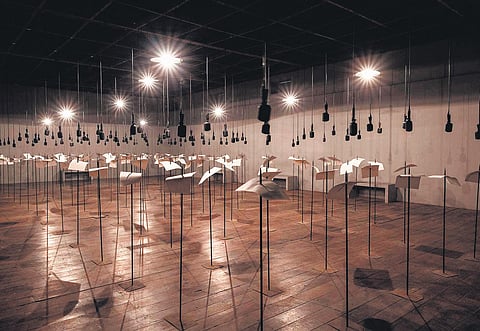

Artist Shilpa Gupta’s haunting, affective and compelling multi-channel sound installation, For, in Your Tongue, I Cannot Fit, gives voice to 100 dissident poets ––Malay Roychoudhury, Ashraf Fayadh, Huang Xiang, Osip Mandelstam, Mahmoud Darwish, Martin Carter, Faiz Ahmad Faiz among others–– from across the globe silenced by the State. As Gupta says in an interview included in the book, the artwork is titled after a poem written by the Azerbaijani poet Ali Imaduddin Nasimi (1369-1417), better known by his pen name Nasimi.
His utterances were considered blasphemous and it is said the religious authorities seized and flayed him alive. For centuries, the voices of poets have been stifled and they were either jailed and tortured or executed for their writing and political leanings. Yet their words live on. Mikhail Bulgakov (1891-1940), the Soviet writer, had written in his novel Master and Margarita, “Manuscripts don’t burn.” Poets die. Their words don’t.
Born in 1976, Mumbai-based Gupta has created complex research-based works that are interactive and participatory using new media, robotic works, lights, photographs and motorised mechanisms. She incorporates text, drawings, objects, sound and video.
The book was published as an adjunct to the 2017-18 installation of the same name that covers a large space. From the ceilings hang 100 reverse-wired microphones that operate as a speaker.
Impaled on spikes standing erect beneath the speakers are sheets of white paper with lines from the poems and works of incarcerated writers. As one steps into the space where the installation is set up, they are overwhelmed as nothing is clearly visible in the half-light. But the sound of the recitation of the printed lines is overpowering. The babble of tongues––Hindi, Chinese, Azaeri, Arabic, English––swells as the recitation turns into a chorus. This potent aural experience resonates long after one has left the space. Our feeble hold on the freedom of expression could not have been better highlighted.
As in the book, the installation was accompanied by other pieces such as drawings with empty spaces representing the victims of forced disappearances and objects (represented by photographs in the book) reflecting on the lives of the poets. The elusive nature of the work may remind one of the experiences of listening to a recital of Claude Debussy’s prelude La cathédrale engloutie (The Sunken Cathedral).
The French composer tells the story of a mythical cathedral engulfed by the sea that rises from under the waves periodically, accompanied by the peal of bells, priests chanting and the sonorous music of the majestic organ. Then it sinks into the deep once again as the music swells. The wide range of the sonic palette leaves the listener wondering if it was just a mirage that had become visible for a few fleeting moments.
Besides the verses by the 100 incarcerated poets that were originally part of the installation, the book also contains reflections on our times when “truth is tying its shoelaces, even as lies have already spread far and wide…” by the likes of Salil Tripathi, a New York-based writer, who is also a member of PEN International’s board. Other such pieces by Jennifer Clement (The Act of Writing a Poem is in Itself
an Act of Revolution), Gautam Bhatia (You Can’t Always Say What You Want: Free Speech and the Law), Karthika Nair (Handbook for Aspiring Autocrats) and Umar Khalid’s Prison Diaries are themselves quite telling, speaking of how the State feels threatened when a poet or writer does not conform to societal norms.
Some of the imprisoned poets and writers scribbled their thoughts despite insuperable odds. Palestinian poet Dareen Tatour tore the zip of her jacket to write on the walls of her prison. Irina Ratushinskaya, a staunch Christian, was picked up during Soviet anti-religious persecution and relegated to the Gulag. She scratched her verse on soap, memorised, and washed. Then written on cigarette papers, smuggled out of prison. In despair, her last lines of A Letter to 1921 are:“… But maybe I will find the right words then/With which I will appear before God.”
Huang Xiang, who had been imprisoned on several occasions between 1958-1995 by the Chinese Communists wrote: “…My only audience/Silence.” Kim Chi-ha, a leading South Korean dissident poet, in the satirical verse Five Bandits puns derisively on the designations of panjandrums: TopCivilSerpent, General-in-Chimp and HighMinisCur. Majrooh Sultanpuri, the acclaimed Urdu poet and activist, and lyricist of popular Bollywood numbers, was imprisoned in 1951.
In Slave of the Commonwealth, Nehru, he denounced independent India’s first prime minister: “He looks like a follower of Hitler,” Sultanpuri wrote. George Orwell’s words, “Don’t let it happen. It all depends on you”, about preventing a “dangerous nightmare situation” as depicted in Nineteen Eighty-Four, have never rung truer.